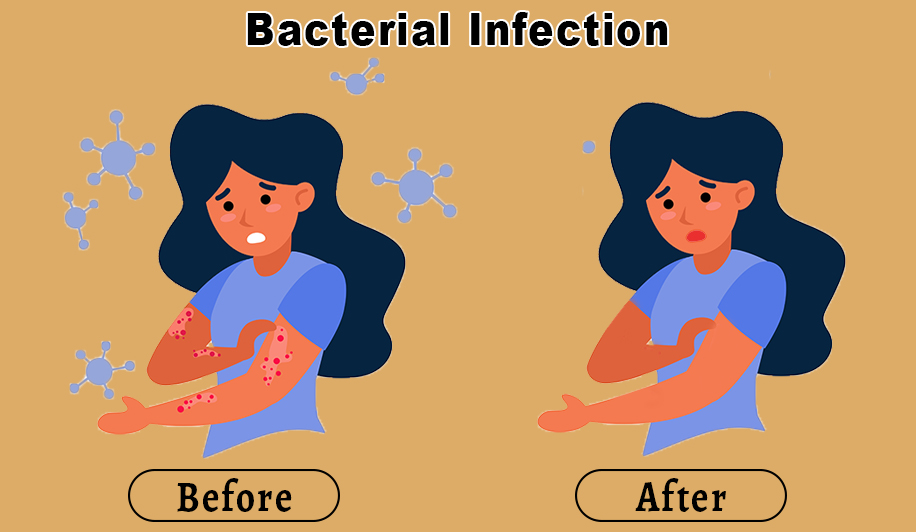Bacterial Infection
Bacterial infection is a kind of dermal condition in which the person’s skin gets damaged or hurt by few harmful bacteria and can cause infections or serious diseases in a living body.
As we know that majority of bacteria in this world are considered as “HEALTHY BACTERIA” as they help in maintaining the health of a person but few bacteria that come in contact with skin harm the skin and can cause severe illness to the person. So, a bacterial infection occurs when the production of bacteria exceeds or the pathogenic bacteria invade the skin and causes eczema, acne, even life-threatening problems such as kidney failure, major shocks, blood poisoning, and trauma. Bacterial diseases are contagious as well.
Symptoms
Bacterial infection’s symptoms differ from person to person like:
1. Coughing
2. Sneezing
3. Fever and trouble breathing
4. Rashes or reddened skin
5. Excessive weakness or sleepiness
6. Nausea, pain, and itching
7. Inflammation
Each person having bacterial infection carries different symptoms and so each person’s problem is handled in a customised manner.
The treatment of bacterial infection goes as follows with these steps:
Initial Diagnosis
Oral medication and antibiotics, which can be given via mouth or through injection
Generally, the type and severity decide the way an antibiotic is given.
After treatment check up
According to the common phrase “Prevention is better than cure”. So certain points need to be considered if any person is wounded:
The skin should be clean after its get injured. Use of antibiotic ointment is preferred.
Good treatment and rest
If the infection gets severe then hospitalisation is also recommended. These infections vary from tiny poles to the entire body surface.
Bacterial infections are caused by the harmful or pathogenic bacteria, which enter by a variety of means:
Contamination of bites, rashes or other breaks in the skin.
Getting bitten by an infected person.
Having chronic disease is also a cause of bacterial infection.
People with diabetes or low blood sugar levels are more at risk of having an infection.
People with HIV or AIDS that contain weak immune system are more prone to bacterial infection.
Skin that is damaged or inflamed by scratching or trauma is more likely to be infected.
Contact with contaminated surfaces and water.
Contact with infected people.
Acute infection and latest skin infection
The person who has uninfected minor wounds should not use antibiotic ointments. So, whenever an infection happens, the wound should be cleaned and washed with soap and further medication is provided to each individual patients. The person who has uninfected minor wounds should not use antibiotic ointments. So, whenever an infection happens, the wound should be cleaned and washed with soap and further medication is provided to each individual patients
Results of PIDAM

